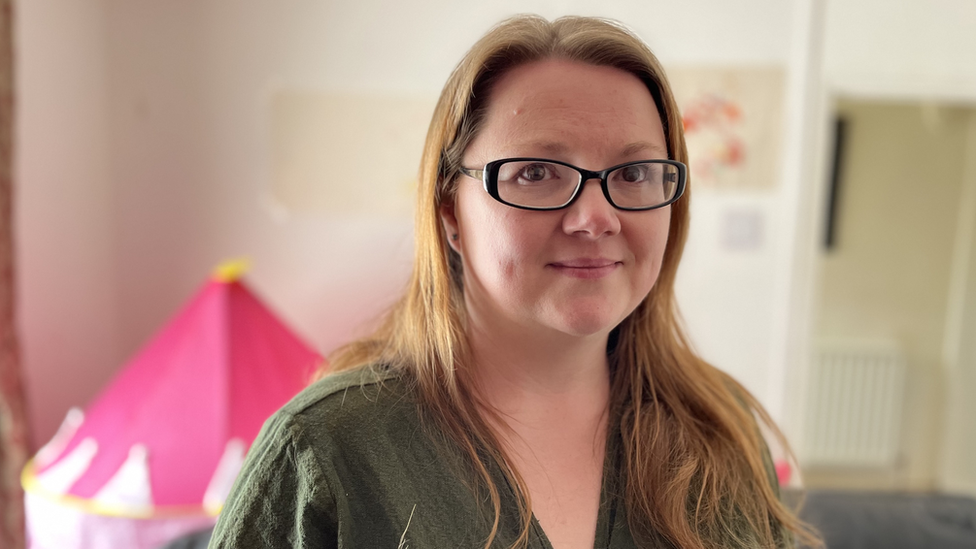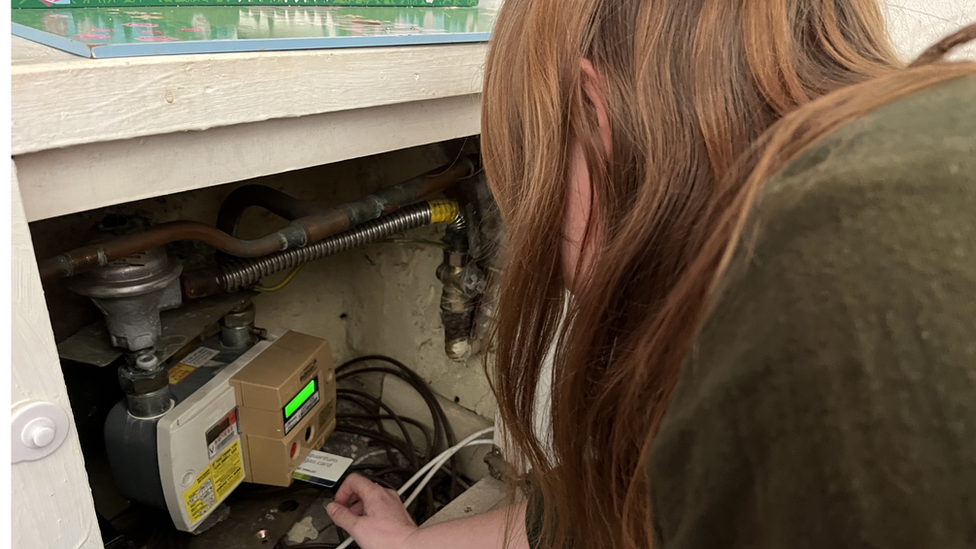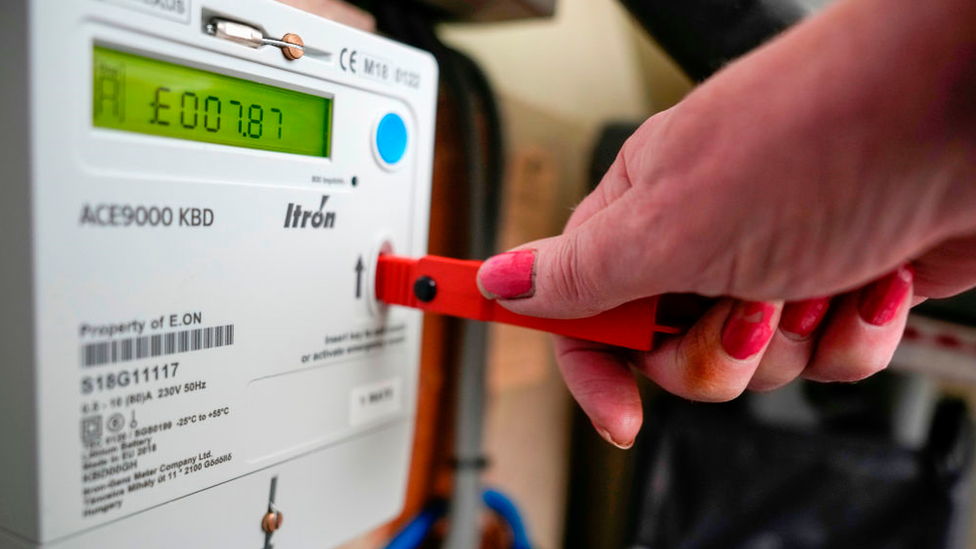Energy: Pre-payment meter inquiry as vulnerable struggle
- Published

Rhiannon Jones worries about keeping her daughter warm in winter
Last Christmas Rhiannon Jones had a card from her mum which said: "Here's £20 towards your gas."
The 35-year-old from Merthyr Tydfil says the money went in her prepayment meter to cook dinner, heat her home all day and "just to take that pressure off".
The forced introduction of prepayment for some customers is a "national scandal", some Senedd members say.
Energy bosses say they need more help in identifying vulnerable customers.
Rhiannon, who lives in a rented house with her partner Dominic and three-year-old daughter Melody, is one of thousands of people in Wales using prepayment meters.
Gas and electricity prepayment meters had already been installed at the house when Dominic first moved into the property.
Rhiannon says that despite asking their landlord to switch away from prepayment, the £250 charge for removing each of them meant it wasn't worth the landlord's while.
"It does feel like it would be a luxury to be able pay [for energy] on direct debit," she added.
Before their daughter was born they would put up with the situation when it was cold and put an extra jumper on or heat up a hot water bottle.

Last winter Rhiannon spent about £300 a month on energy and struggled to keep her home heated above 18 degrees
But that all changed when Melody was born with bronchiolitis, a common chest infection that affects babies but which has led to a weakness in her chest.
It means keeping her warm and comfortable is even more important.
"As every parent does you always feel the guilt of 'is my child warm enough?' 'Am I doing a good enough job?'," Rhiannon said.
Last winter, while their monthly rent was £450, Rhiannon, who works in insurance, paid £300 a month in energy bills alone, and struggled to keep the temperature above 18 degrees.
Last Christmas was "hard", she said.
"As I was tidying up over the weekend, I found a card that my mother had given me," she added.
"She had written in the card, 'Here's £20 towards your gas,' for the heating for Christmas Day - so that she knew that I had money to cook my Christmas dinner, to be able to put the heating on all day. Just to take that pressure off, so I didn't have to worry about the constant mental ticking-down of the meter."
The Senedd petitions committee began an inquiry after receiving a petition that calling on its members to "scrutinise the prepayment meter scandal in Wales".
Identifying vulnerable people
In opening the inquiry on Monday, committee chairman Jack Sargeant said he agreed with the description after reports of energy companies forcibly installing prepayment meters.
Mr Sargeant said: "What we have seen over the last year is nothing short of a national scandal, as the petition suggests, when it comes to energy suppliers forcibly installing prepayment meters."
Among those to give evidence was Neil Kenward from energy regulator Ofgem.
Mr Kenward said the regulator had reminded suppliers to only forcibly install a prepayment meter "where it is safe and reasonably practicable to do so".
Under new rules announced in April, customers must be given more chance to clear debts and forced meter fittings will be banned in homes with residents all aged over 85, Ofgem said.
The new rules disappointed campaigners who called for an outright ban on prepayment meters.
Asked about Ofgem's plans to make the new code of conduct legally enforceable, Neil Kenward said: "That is absolutely a top priority for us."
He added: "That should give some reassurance. And I can be really clear that we will be monitoring the industry to make sure they are adhering to the code."
Prepayment meters have historically been a more expensive source of energy.
While those with a prepayment meter pay a lower price for each unit of electricity they use, they pay more for their gas and have higher standing charges for all energy compared to direct debit customers.
From July more prepayment energy charges will be brought in line with customers who pay by direct debit.
The change will affect more than four million UK households who are set to save £45 a year on their energy bills.
Chief executive of British Gas owner Centrica, Chris O'Shea, told the committee a national register of vulnerable people was required.
"It is difficult for us to differentiate between those who can't pay, and those who won't pay," he said.
He added that work was required to understand "how we help those who cannot pay".
He rejected the suggestion the industry had been poorly regulated.
"We are subject to extensive regulation," Mr O'Shea said.
"There's a question as to whether that regulation is effective, and there's a question as to whether that regulation is well enough designed.
"But I don't think it is right to say that energy companies are marking their own homework."
Approximately 200,000 households in Wales use pre-payment meters for their mains gas and electricity, according to the Welsh government, external.
This includes around a quarter of all tenants in the private sector, and almost half of social housing tenants.
Andrew Ward, chief executive of Scottish Power's retail business, told Senedd members that a small proportion of forced prepayment meter installations, carried out under warrant, were in Wales.
He said: "Of the 24,000 meters that we installed throughout the UK, about 5% of our warrants were in Wales. We installed 1,305 prepayment meters in Wales through warrant.
"We have a really small percentage of customers, less than 10% ,who are actually paying a debt with their prepayment meters."
Also giving evidence was Darah Vyas from trade body Energy UK.
She said that prepayment meters served an important function for some customers.
"Prepay does play a really important role for a lot of people who have in the past found it a really useful tool to help them to budget, to understand what they are paying and to manage what they are paying," she said.
Related topics
- Published31 March 2023

- Published18 April 2023

- Published12 March 2023
